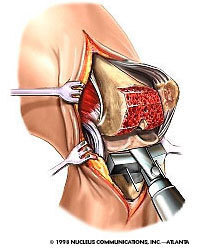Technology Helps Surgeons Get Near-Perfect Knee Implant Alignment
by
Amanda Doreson, Project Manager | February 19, 2007

Image-guided technology
helps orthopaedic surgeons
perform knee replacements.
Using image-guided technology, orthopaedic surgeons are able to align knee implants with near pinpoint accuracy. For patients undergoing total knee arthroplasty, close to perfect alignment should translate into longer durability of joint replacements, according to a renowned panel of orthopaedic surgeons who discussed advancements in computer-assisted total knee replacement (TKR) surgery at the recent 74th Annual Meeting of the American Academy of Orthopaedic Surgeons.
Approximately 300,000 knee replacement surgeries are performed each year in the United States. Standard knee replacements require the use of an intramedullary (IM) rod, which is inserted up the length of the femur to determine proper knee implant alignment. No IM rod is necessary for the computer-assisted approach, reducing the risk of fat embolization, a complication that can cause acute respiratory distress. The quality and accuracy of the image guidance may enable surgeons to use smaller incisions while achieving the same successful outcomes.
"Computer assisted total knee arthroplasty surgery is making rapid progress," said Dr. Daniel J. Berry, professor and chairman of Orthopedics at the Mayo Clinic in Rochester, Minnesota. "Contemporary methods of computer-assisted surgery now have been proven to provide a high level of accuracy in experienced hands. Current efforts are focused on making the process simpler, more efficient, and more cost effective. As these methods evolve, it seems likely some form of computer assistance will eventually become a routine part of total knee arthroplasty," Dr. Berry said.
Computer-assisted TKR involves extra time and additional difficulty because it still is in its infancy. As the power of the technology and techniques become more established, it will become a more common procedure and an option for more surgeons and patients.
A media briefing on What's New In Computer Assisted Total Knee Surgery was moderated by Daniel J. Berry, MD, and included speakers Kenneth Krackow, MD, and Thomas P. Vail, MD.
